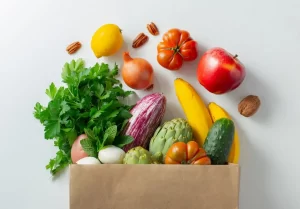
Organic food is food that is produced without the use of synthetic pesticides, herbicides, or fertilizers. Organic farming practices also focus on building healthy soil and protecting the environment.
Lately, more and more people are getting curious about organic food. Many people believe that organic food is healthier and better for the environment than conventional food.
But what are the real benefits of organic food? And why should we consider choosing organic options?
Benefits of organic food
There are many potential benefits to choosing organic food, including:
- Healthier food: Organic food may be more nutritious than conventional food. For example, organic milk contains higher levels of omega-3 fatty acids and conjugated linoleic acid (CLA).
- Reduced exposure to pesticides: Organic food is grown without the use of synthetic pesticides, which can be harmful to human health.
- Environmental benefits: Organic farming practices are better for the environment than conventional farming practices. For example, organic farming helps to reduce soil erosion and water pollution.
Insights from the specialists
Here are some insights from specialists on the benefits of organic food:
- Dr. Charles Benbrook, research professor at Washington State University: “Organic food is better for the environment, better for your health, and tastes better.”
- Dr. Alan Greene, medical director of the Center for Humane Technology: “Organic food is better for your health because it contains fewer pesticides and herbicides. It’s also better for the environment because it uses less energy and water.”
- Dr. Andrew Weil, integrative medicine physician: I suggest that my patients choose organic food because it’s healthier for them and also better for the environment.
Conclusion
There is a growing body of evidence that suggests that organic food is healthier and better for the environment than conventional food.
If you are able to afford it, choosing organic options is a good way to support your own health and the health of the planet.
Here are some additional tips for choosing organic food:
- Check for the special USDA organic label on food items. This label ensures that the food has been certified organic by the United States Department of Agriculture.
- Buy organic food from local farmers whenever possible. This helps to reduce the environmental impact of transporting food.
- Start by choosing organic options for the foods that you eat most often. This is a good way to make the switch to organic food more affordable.
